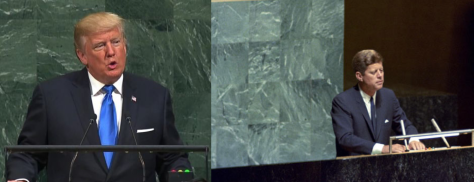In the years following 9/11, the War on Terror has been the subject of numerous films, television shows, and other forms of popular media. One such drama series is Homeland, which premiered in 2011. The show follows CIA operations officer Carrie Mathison as she investigates Nicholas Brody, a missing and presumed dead US Marine Sergeant held by al-Qaeda for eight years. Mathison, who was alerted by an informant when she was a field agent in Iraq that an “American prisoner of war [had] been turned,” suspects Brody of being the sleeper agent when he is rescued from an al-Qaeda compound.
The rhetoric of the Cold War is most evident in Homeland through the simultaneous fear of a foreign ideology gaining international influence, and the threat of enemy infiltration into the domestic sphere. The former is addressed more broadly as the War on Terror provides a backdrop to the events of the show and is framed as an existential and ideological conflict (as highlighted by the line, “why kill a man when you can kill an idea?” in the season finale); however, suspicion of an insider threat in the form of Nicholas Brody is quite literally the focal point of the show’s first season. Cold War emphasis on constant surveillance is demonstrated by Mathison’s interrogation and suspicion of Brody’s every move and body language, as well as her unauthorized installation of monitoring devices throughout his home prior to his return to his family. The constant vigilance demanded by containment culture is also highlighted by the suspicion of Brody’s seclusion from the family unit by his daughter Dana.
The connection made during the Cold War between national security and the fabric of domestic life is also explored in Homeland. While Brody struggles to embrace his role as poster child for patriotism, public service and the military efforts in Iraq and Afghanistan, tensions in his family life emerge. His wife Jessica’s affair with his best friend during his absence is revealed, and his relationship with his children suffers significant strain. Brody’s conversion to Islam is also treated as a source of suspicion which contributes to his Othering and the disconnect from his family. Thus, as was the case during the containment culture of the Cold War, the inability to conform to norms of ideal familial behavior is tied to issues of national security. This is particularly reinforced in the show’s season finale when it is a plea from Dana that ultimately convinces Brody against carrying out a terrorist attack. Fear of both the enemy inside and encroachment of a pernicious ideology from the outside, in addition to the need to conform to set standards of personal and familial behavior, are themes which clearly place narratives surrounding the War on Terror within in the framework provided by Cold War containment culture.



